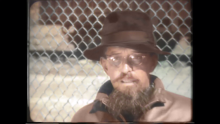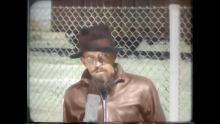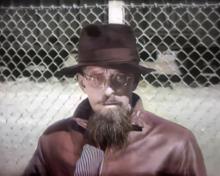The following notes are summarized from the Diocesan Archive.
Father Poletti came to Hong Kong in 1930, having completed his studies in Milan and, as a graduate student, in the Gregorian University, Rome. He served first as assistant priest in Waichow and later as Rector of Tam Tong District, Kwangtung. He was interned when the Sino-Japanese War reached his district. On his release in 1942, he came to Hong Kong, first as Rector of the New Territories and later as assistant priest in St. Teresa’s Kowloon. After the war he returned to Tam Tong as Vicar Forane.
In 1950, the most memorable period of his life began with his appointment as Rector of Shatin, which then included Taipo and Fanling. Before long he was probably the best known man in the whole district. His universal friendliness and his superabundant energy shone through every word he said. He was habitually brusque, without ever offending, and the courtesy which replaced the brusqueness when the occasion called for it was as unstudied as his brusqueness. His dogs and his birds - above all the mynah bird that used to mix “Ave Maria” with less pious chatter-spread his fame as a character. Parishioners and police and everyone else quickly came to like and trust the flery ball of energy that shot round the New Territories in ceaseless apostolic and pastoral work.
When the stream of bishops, priests and religious began to cross the border in the early 1950s, Father Poletti took upon himself the task of meeting them. The police at the border knew that Father Poletti would rush to their post at any hour of day or night to greet an arrival. The expellees, arriving weary and despondent, were heartened, and invigorated by the high-spirited friendliness of their reception, and many of them would treasure the memory of that meeting till their dying days.
Father Poletti's most dramatic moment came when an ill-clothed expellee said “I am Bishop Bianchi.” Father Poletti popped his Bishop on the pillion of his motor bicycle, rushed him to the presbytery, telephoned the Bishop’s House, and re-clothed the bishop in preparation for his reception at Tsim Sha Tsui.
All this did not interfere with his work in his district. It was because he was a superb parish priest and commanded the respect and cooperation of all that he was able to accomplish his work of priestly charity.
He built the church and presbytery in Fanling and became Rector of Fanling when the growing Mission District was divided in 1957. He held this post till early 1973 when ill health forced him into reluctant retirement.
The Italian government conferred the Grand Cross of the Republic on him in 1956 in recognition of his work for Italian expellees, Very typically, Father Poletti used the presentation of the Cross as an occasion for making it clear that the idea of a border patrol had originated not with himself but with Father Paul Duchesne, MM.
His last year was a trial of spirit to Father Poletti, His heart retained its old energy and fire, but his weakening body could no longer accomplish his desires. He had had to leave his church, his famous Christmas crib and his loving and beloved parishioners, though many of these came to him when he could no longer go to them.
He used his dwindling energies to the utmost. On Christmas Day, he celebrated two Masses. On St. Stephen’s day he suffered his final heart attack and died within half an hour.
The Requiem Mass for the repose of his soul was celebrated on 29 December in St. Margaret’s Church, Happy Valley, by Father Philip Commissar, Regional Superior of the PIME, and a large number of his confreres. The farewell blessing was given by Bishop Peter Lei of Hong Kong. Bishop Lei also officiated at the graveside. A large gathering of the faithful testified both in the church and in the cemetery to the abiding and widespread affection Father Poletti aroused wherever he was known.
There is a photograph and more detailed information on Father Poletti's rescue exploits on the link to The Remnant Newspaper.



Comments
Hi Jill, glad to see your…
Hi Jill, glad to see your sharing about Father Poletti. May I ask if you're a Catholic as well conducting research over the history of Catholic Church in Hong Kong?
I recently found a precious video where there's an actual footage about Father Poletti in 1958. You can fast forward to 3:35 and see him speaking while saving one of the priests coming from Mainland China:
https://www.youtube.com/watch?v=8D9cKoXQGOc
Thank you, kuievita, for…
Thank you, kuievita, for adding the link to the video that shows Father Poletti. I saw this video two years ago and then I could not find it anymore; have been looking for it ever since.
My grandmother knew Father Poletti in the 1940s, as did her children, my aunts. They said Father Poletti was a good man.
There is a photo of Father…
There is a photo of Father Ambrogio Poletti standing with others in front of the Mother Mary grotto that is on the church grounds of St. Joseph's Church, Fanling, on this Italian website:
https://www.mondoemissione.it/missione/hong-kong-60-anni-di-missione-pe…
The current Italian priest at St. Joseph's, Father Dossi, recently informed me that the grotto is still there.
Father Poletti
Thank you kuievita for the link to the video showing Father Poletti welcoming the bishop from China. My research has been into the lives of my own family in Hong Kong from 1866 to 1941. My English grandfather, Charles Warren, was befriended by the Polish priest, Father Augustin Placzek after the accidental death of his toddler son in 1900. He was accepted into the Catholic Church and his four subsequent children were baptized into the Catholic Church. My grandfather supported the Catholic Church in Hong Kong and the Catholic missions on the China coast until his death in 1923. His charitable work was continued by his son, Leslie Warren, who regularly visited the missions until he left Hong Kong in 1941. Father Placzek died in 1928 and Father Poletti must have succeeded him. I did not find out until fairly recently that my own father had been baptized into the Catholic Church. He never mentioned it. I myself was baptized into the Church of England.
Father Poletti and PIME fathers
I am delighted to receive responses and information from Aagg and Jill!
First, regarding Father Poletti: two months ago, my wife and I visited St. Joseph's Church in Fanling, and I must say, the renovated church is a must-see. As Aagg mentioned, the church beautifully preserves the grotto, seamlessly integrated with the surrounding garden.
Father Poletti, as described in the article shared by Jill, truly was an exceptional man. Not only did he warmly greet many priests from Mainland China at the border, but he also established St. Joseph's Church in 1954, making it a focal point for Catholics in the New Territories. Additionally, he played a significant role in founding De La Salle Secondary School in Sheung Shui in 1958. He was actively involved in local activities; I recently came across an article in the South China Morning Post archives from the 1950s, where he enthusiastically participated in beating the local drum during the Tuen Ng festival's dragon boat competition—quite amusing!
However, I would like to clarify two points: the video featuring Father Poletti should be Bishop Mario Civelli. Furthermore, historical records indicate that Father Poletti was not ordained as a priest when Father Placzek passed away in 1928. Father Poletti's first arrival in Hong Kong was during World War II, after being released by the Japanese from Huizhou in 1942. Thus, there may not be a direct connection between Father Poletti and Father Placzek.
Despite these differences, there is a common thread among these remarkable priests. All mentioned here, including Father Placzek, Father Poletti, and Father Mario Marazzi (featured in the Italian article), were from the Pontifical Institute for Foreign Missions (PIME). Established in 1850, this society has served Hong Kong since 1858, sending numerous missionaries—most from Italy, but also from other places like Father Placzek from Poland—to assist the local community. They are truly "unsung heroes," providing vital support in areas such as food, social welfare, education, and historical research, often with humility and a low profile. I have had the pleasure of meeting Father Mario Marazzi several times; at now around 95 years old, he still remains a kind and helpful person who has greatly aided my historical research. Their contributions to Hong Kong society are invaluable, yet their stories often go unheard.
My friends and I have recently created a dedicated Facebook page for another great PIME priest, Father Enea Tapella, who served in Hong Kong from 1957 to 1977, focusing on helping those with physical and mental disabilities—an often neglected group facing significant discrimination at the time. Tragically, Father Tapella's death in a traffic accident in 1977 led to the founding of Fu Hong Society, one of Hong Kong’s largest NGOs, which continues to support individuals with mental disabilities in honor of his legacy. In my research on Father Tapella, I have uncovered many moving stories and collected precious artifacts. Here’s our Facebook page about Father Tapella, which chronologically lists his contributions to Hong Kong. I welcome your thoughts and comments:
https://www.facebook.com/permalink.php?story_fbid=pfbid02Gx9UZb8922zZPj…
We aim to expand our coverage of PIME priests who served in Hong Kong between 1945 and 1979. I would greatly appreciate the opportunity to connect with both of you to gather your research on these extraordinary individuals. If you don't mind would you kindly share your e-mail addresses, or send yours to me privately to kuievita@gmail.com. Please stay in touch!
Fathers Poletti and Placzek
I believe I got my information about Father Poletti arriving in Hong Kong in 1930 from the Diocesan Archives in Hong Kong. It seems he did not stay very long. Father Placzek also arrived via Milan. I don't know who took over from him. I believe he had to leave Hong Kong during WW1 because of Italy's alliance with Germany and his own connection with Italy. I'm afraid all my information comes from the internet rather than research on the ground, so I don't think that I can be of much help. My uncle was the last member of my family to be in Hong Kong. He left in 1941. He was given rather a wonderful figure of Buddha as a leaving present from the China missions that his grandchildren still have. I don't have any post-1945 information.
Hi Jill, no worries at all…
Hi Jill, no worries at all and thanks again for all your replies!
There were two Catholic priests that had the name, "A. Poletti"
Brief Description of Father Poletti in "Hong Kong Then"
I today came across to a book written by Brian D. Wilson, who once served as District Officer in the New Territories, during 1950s. In his memoir published in 2000, "Hong Kong then", there was a funny description about Father Poletti by him. Allow me to quote this here:
[Quote]
It was in the 1950s that China began to expel European missionaries, many of whom had lived most of their lives in China. The daily train from Canton brought loads of tired, bewildered priests and nuns, with few possessions and little or no idea of what would happen next. Father Poletti, the resident Roman Catholic Priest in Tai Po, met the train every day at Lo Wu station on the border, where passengers were obliged to disembark on the Chinese side of the bridge, walk across on foot with their baggage, pass through HK immigration and customs before getting on the HK train to Kowloon (neither side allowed its rolling stock across to the other side, for fear of not getting it back again). It was up to each religious denommatlon to take care of its expelled clergy, the majority being helped back to their country of origin.
Father Poletti was a bearded, voluble Italian who rode a motorcycle with a lighted cigarette burning fiercely between his whiskered lips. In his modest village house in Fanling, he kept a crested mynah in a cage. "Go on, say Ave Maria, damn you," he would rage at the bird.
[Unquote]
Fr. Poletti
Fr. Poletti was a part of my social circle when I was growing up in TaiPo.
I was one of number of us who were his altar boys in the period 1955 to 1965. We knew him from about 1952 onwards. He started out with a small church in a flat in TaiPo Market roughly opposite where the drive to the old Police station and District Office leads off the main road.
Around about 1952 he was gifted a plot of land in Fanling, near Luen Wo Market and built a new church there.
A big event that happened on 17th Oct 1952 was when Poletti received a phonecall from the border police saying that a priest had just arrived from China saying he was the bishop of HK, and could Poletti get there quickly to sort things out. Poletti soon had the bishop on a train to Kowloon where a crowd had already gathered to escort the bishop to the cathedral in Caine Road.
Poletti’s activities and influence were woven into the life of TaiPo and Fanling and you could (should ? ) write a write a book about his life and times in the district.
Some years back I visited St Joseph’s Church Fanling and found a large group of past parishioners there from all over HK. Apparently groups of people whose past is entwined with Fanling and TaiPo make regular visits to the church out of respect to a man whose life was one of example and action, although he was capable of choice words when the occasion required.
Hi palfreeman, Many thanks…
Hi palfreeman,
Many thanks for your precious sharing! Actually my friends and I were in an initiative trying to write more about Father Poletti, Fanling and Taipo (as well as Father Santinon). It would be great if we can connect via e-mail, so that I can inquire from you more about stories in the early days in TaiPo and Fanling. Here's my e-mail address: kuievita@gmail.com. (my name is Anthony)
Looking forward to your reply!
Thank you, palfreeman, for…
Thank you, palfreeman, for sharing with us that you were an altar boy for Father Poletti. It is good to know that a Gwulo contributor actually knew him in person for many years.
Regarding what you wrote, "although he was capable of choice words when the occasion required", it is interesting to note from his obituary on this link (to a Bangladeshi PIME page, which I got thanks to kuievita, but you have to click on "English" to translate it from Italian):
https://atma-o-jibon.com/italiano8/hong_kong_memoria_speranza8.htm
Judging by what Father Poletti wrote in his will, he knew that he had choice words at times, but wanted to say sorry by giving an explanation in the end.
The Polettis
User aag reveals the earlier Attilio Poletti, born 1877, a linguist. Is it not remarkable that an earlier Poletti authored, in 1889, a "Pocket English and Chinese Vocabulary" and, in 1896, a "Chinese and English Dictionary, Arranged According to Radicals and Sub-radicals"? Surely the three were related and surely the first of them, the author Poletti, also visited China and was the forerunner in doing so. More research required!
The two Polettis might have…
The two Polettis might have been uncle and nephew. Both had a talent for learning Chinese dialects. Yes, more research required!
The family trees for Attilio…
The family trees for Attilio and Ambrogio have different family member names on the genealogy website that I checked, so the two Polettis are most probably NOT related.
Polettis from Lake Como
Attilio, Ambrogio and Ugo (Cardinal) were all born near Lake Como.
Perhaps they were all…
Perhaps they were all related, but distant family relations.
My family (grandmother and…
My family (grandmother and her daughters, my aunts) lived on Clearwater Bay Road in Kowloon, and in 1942 with the bombing at nearby Kai Tak Airport, the family moved to one of the flats owned by Catholic priests, next to St. Teresa's Church on Waterloo Road. One of my aunts, who was aged 14 at the time, said that Father Poletti was a kind man and he stood with them in the hallway when they got scared hearing bombs exploding in Kowloon.
Later when Father Poletti worked at St. Joseph's Church in Fanling, my aunts would visit him there. He was from Lake Como in Italy, and in the garden at St. Joseph's Church, he built a small fishpond as a memorial for his parents. He once showed my aunt a picture of his mother that he carried around with him. He gave a chain to my aunt and on the pendant were his initials "AP".